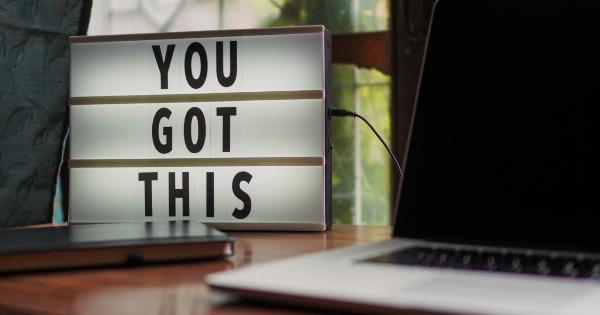Depression is a mental health condition that affects millions of people worldwide. It can be debilitating and even life-threatening if left untreated. Coping with depression can be challenging, especially if you don’t know where to start.
That’s why we’ve put together this list of 30 ways to cope with depression.
1. Seek Professional Help
The most effective way to cope with depression is to seek professional help. This may include therapy, counseling, medication, or a combination of these treatments.
A mental health professional can help you identify the causes of your depression and develop a treatment plan that works for you.
2. Stay Active
Physical activity can be a great way to cope with depression. Exercise releases endorphins, which can improve mood and reduce stress. Try to get at least 30 minutes of physical activity every day, even if it’s just going for a walk.
3. Practice Mindfulness
Mindfulness is the practice of being present and fully engaged in the moment. This can help you cope with depression by reducing stress and anxiety. Try practicing mindfulness meditation or yoga to help you stay centered and focused.
4. Set Realistic Goals
Setting achievable goals can help you feel more in control of your life and boost your self-esteem. Start with small, manageable goals and work your way up to larger ones. Celebrate each success and use it as motivation to keep going.
5. Connect with Others
Isolation can make depression worse, so it’s important to connect with others. Reach out to friends and family, join a support group, or volunteer in your community. Social connection can help you feel less alone and more supported.
6. Get Enough Sleep
Sleep is essential for good mental health, so make sure you’re getting enough of it. Aim for 7-8 hours of sleep each night, and try to establish a bedtime routine to help you wind down and prepare for sleep.
7. Eat a Healthy Diet
A healthy diet can help you cope with depression by providing your body with the nutrients it needs to function properly. Aim for a balanced diet that includes plenty of fruits, vegetables, lean protein, and whole grains.
8. Practice Relaxation Techniques
Relaxation techniques like deep breathing, progressive muscle relaxation, and guided imagery can help you reduce stress and anxiety. Try incorporating these techniques into your daily routine to help you cope with depression.
9. Learn a New Skill
Learning a new skill can be a great way to boost self-esteem and reduce stress. Try learning a new language, taking an art class, or learning to play an instrument.
10. Take Breaks
It’s important to take breaks throughout the day to recharge and prevent burnout. Take a few minutes to stretch, meditate, or listen to music.
11. Practice Gratitude
Gratitude can help shift your focus from negative to positive. Try keeping a gratitude journal where you write down things you’re thankful for each day. This can help you keep perspective and appreciate the good things in your life.
12. Connect with Nature
Spending time in nature can be a great way to reduce stress and boost mood. Try going for a walk in the park, hiking in the woods, or gardening.
13. Limit Social Media
Social media can be overwhelming and can contribute to feelings of depression and anxiety. Try limiting your social media use or taking a break altogether.
14. Get Creative
Creativity can be a great way to cope with depression. Try painting, drawing, writing, or engaging in other creative activities that bring you joy.
15. Practice Self-Care
Self-care is essential for good mental health. Make sure you’re taking time to care for yourself by practicing good hygiene, getting enough rest, and doing things that make you feel happy and fulfilled.
16. Take Medication as Prescribed
If you’re taking medication to manage your depression, make sure you’re taking it as prescribed. Don’t stop taking your medication without talking to your doctor first.
17. Challenge Negative Thoughts
Depression can often lead to negative thinking patterns. Challenge these thoughts by asking yourself if they’re based in reality. Try to replace negative thoughts with positive ones.
18. Stay Organized
Staying organized can help you feel more in control and reduce stress. Make to-do lists, keep a calendar, and declutter your living space to help you stay on top of things.
19. Practice Deep Breathing
Deep breathing can help reduce stress and calm the mind. Try taking deep, slow breaths in through your nose and out through your mouth.
20. Seek Support from Loved Ones
Don’t be afraid to reach out to loved ones for support. Let them know how they can help you, whether it’s just listening or helping with household tasks.
21. Listen to Music
Music can be a great way to relax and boost mood. Create a playlist of songs that make you feel good.
22. Challenge Yourself
Challenge yourself to try new things and step outside of your comfort zone. This can help build confidence and reduce feelings of hopelessness.
23. Practice Assertiveness
Being assertive can help you feel more in control of your life and reduce stress. Practice saying no when you need to and advocating for yourself in social and professional situations.
24. Volunteer
Volunteering can provide a sense of purpose and fulfillment. Find a cause you’re passionate about and get involved.
25. Avoid Drugs and Alcohol
Drugs and alcohol can make depression worse and interfere with medication treatments. Avoid using them if possible.
26. Seek Treatment for Co-Occurring Conditions
Depression often co-occurs with other mental health conditions like anxiety or substance abuse. Seek treatment for these conditions as well to improve your overall mental health.
27. Stay Positive
Staying positive can help shift your mindset and improve mood. Try to focus on the good things in your life and practice gratitude.
28. Laugh More
Laughter can be a great way to reduce stress and improve mood. Watch a funny movie, spend time with friends who make you laugh, or listen to a comedy podcast.
29. Stay Hopeful
Remember that depression is treatable and that things will get better with time. Stay hopeful and keep working towards your goals.
30. Celebrate Successes
Celebrate small successes along the way and take pride in your accomplishments. This can help build self-esteem and motivation to keep going.




























